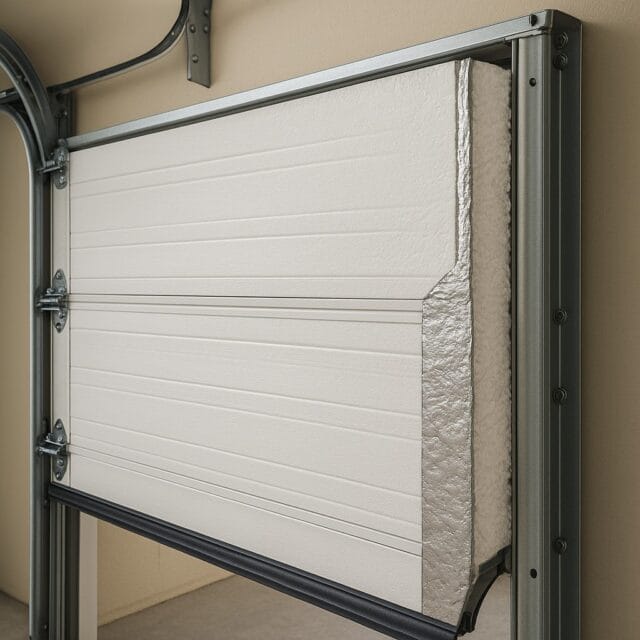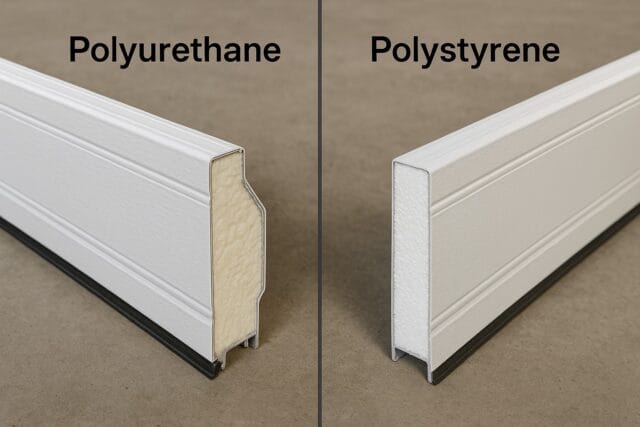Last winter, a homeowner in Lincoln, NE, reached out to us with a frustrating issue. Her garage was so cold that it caused the pipes in the wall shared with the house to freeze. Her garage door, while newer, wasn’t insulated. After one of our trained technicians inspected the situation, we installed a high-quality insulated garage door with thick insulation, rigid polyurethane foam, and a higher R-value. The difference was immediate indoor temperature stabilized, and her energy bills dropped noticeably. That’s the power of proper garage door insulation.
According to the U.S. Department of Energy, a poorly insulated or non-insulated door can cause up to 30% of household heat loss. For New England homeowners who experience freezing winters and sweltering summers, that’s a significant energy drain. Your garage door, which is one of the largest openings in your home, becomes a key point of thermal transfer, either letting warm air out or cold air in.
As one of the most trusted names in the area for garage door services, Alpine Garage Doors New England understands the value of making smart, long-lasting home improvements. Installing insulated garage doors is one of the most effective ways to protect your garage space, lower your energy bills, and boost the overall comfort and value of your home.
What Is an Insulated Garage Door?

An insulated garage door is a specially constructed door that includes one or more layers of insulation material between the inner and outer layers of the door panel. These materials often include polyurethane, polystyrene, or styrofoam, each offering different levels of heat insulation, strength, and noise reduction.
Many modern garage doors are built using steel or aluminum exteriors that sandwich a layer of foam insulation. For instance, polyurethane is a high-density foam that provides superior R-values a measure of how well insulation resists thermal transfer. The higher the R-value, the better the insulating properties of the garage door.
There are many insulation types to choose from:
- Polystyrene: Lightweight, affordable, and decent energy-efficient performance.
- Polyurethane: Denser, provides higher R-values, and adds structural strength.
- Batt insulation: Used in some custom builds, less common for garage door kits.
- Rigid foam: Great for door insulation kits and retrofitting existing garage doors.
This layered construction not only makes the garage door more energy-efficient but also significantly stronger and more resistant to dents, warping, and other damage caused by weather or everyday use.
Benefits of Insulated Garage Doors for New England Homes
1. Superior Energy Efficiency and Temperature Control
New England is famous for its chilly winters and humid summers, and without a properly insulated garage, you’re losing valuable heat or cool air. An insulated garage door acts as a barrier that reduces heat transfer, stabilizes indoor temperatures, and lowers your reliance on HVAC systems. This results in real energy savings over time.
By installing a garage door with a high R-value, preferably 10 or above, you’ll reduce energy loss and create a more energy-efficient environment. Whether you’re parking your car, storing tools, or using your garage as a hobby space, this makes a big difference.
2. Enhanced Comfort in Your Garage Space
Think of your garage not just as a storage room but as an extension of your home. Whether it’s a car garage door, workshop, or workout space, keeping it at a reasonable temperature is key. Insulated garage doors help maintain a comfortable environment year-round, making the space more livable and versatile.
A stable temperature also protects items stored in your garage, such as paint, electronics, or holiday decorations, from damage caused by extreme heat or cold.
3. Noise Reduction and Peace of Mind
One of the most underrated benefits of insulated doors is how much quieter they are. The additional insulation material acts as a sound barrier, absorbing vibrations and reducing outside noise, like traffic, wind, or a noisy garage door opener.
This is particularly helpful if your garage is attached to living spaces or bedrooms. You’ll experience a noticeable difference in everyday sound levels, particularly with brands like Chamberlain garage doors or Craftsman garage doors, which already offer smooth operations enhanced by proper insulation.
4. Long-Term Durability and Protection Against Weather
Garage doors in New England take a beating from snow, ice, wind, and rain. An insulated door is generally stronger due to its multi-layered design. This helps prevent dents, cracking, and warping.
Popular brands like Clopay garage doors, Martin garage doors, and Amarr garage doors offer insulated garage doors made from high-quality steel, fiberglass, or aluminum, which are known for withstanding harsh weather conditions. A well-constructed insulated door can also protect your garage’s logic board and garage door opener from temperature fluctuations and moisture damage.
5. Improved Home Value and Curb Appeal
An insulated garage door is a smart investment with a strong return on investment (ROI). Not only does it offer energy efficiency and lower maintenance costs, but it also boosts your home’s appearance. You can choose from a wide range of styles, colors, and door types to match your home’s aesthetic.
Whether you’re opting for a new garage door or upgrading your current one with an insulation kit, the right choice can improve curb appeal and add real market value to your property.
Comparing Insulated vs. Non-Insulated Garage Door
| Feature | Insulated Garage Doors | Non-Insulated Garage Doors |
| Energy Efficiency | High (lowers energy bills) | Low (significant energy loss) |
| Temperature Control | Stable, year-round | Unstable, extreme cold/heat |
| Noise Reduction | Excellent | Poor |
| Strength & Durability | High (resists dents/weather) | Lower |
| Cost | Higher Initial Cost | Lower Initial Cost |
| Long-Term Savings | High (due to energy savings) | Low |
While the initial cost of an insulated garage door may be higher, the pros, including lower energy bills, less noise, and longer product lifespan, far outweigh the cons.
A Step-by-Step Guide to Choosing the Right Insulated Garage Door
- Determine Your Needs
Consider how you use your garage space. Do you need noise reduction? Better temperature control? Evaluate your insulation priorities. - Understand R-values and U-values
Higher R-values mean better insulation, while U-values (lower is better) reflect how much heat escapes. Ask about both to gauge performance. - Choose Your Materials Wisely
- Steel: Strong and durable, best paired with urethane or polyurethane.
- Aluminum: Lightweight and corrosion-resistant, good for coastal areas.
- Fiberglass: Excellent weather resistance and aesthetic options.
- Wood Composite: Offers great looks but may require more upkeep.
- Pick a Door Type and Style
From sectional doors to single doors, options vary widely. Match your garage door with your home’s design using garage door guides or our expert input. - Consider Insulation Type
Choose between polystyrene, polyurethane, rigid foam, or even batt insulation. For DIY upgrades, door insulation kits are available.

- Talk to a Professional
A licensed technician from Alpine Garage Doors New England can assess your needs and help you choose the perfect fit for your home and budget.
Maintenance Tips for Insulated Garage Doors
Even the best garage door products require maintenance:
- Inspect weather seals to ensure there are no air leaks or cracks.
- Lubricate moving parts, especially around the garage door opener and rollers.
- Clean the door panels with mild soap to remove salt and grime from harsh weather.
- Check the logic board and light socket for proper operation.
- Look for signs of wear on the foam insulation or door panels.
Following these maintenance steps can prolong the life of your insulated garage and save you money on repairs down the road.
Frequently Asked Questions (FAQs)
1. Can I insulate my garage door instead of buying a new one?
Yes, you can use garage door insulation kits like rigid foam panels or reflective insulation, but they won’t perform as well as a professionally installed insulated garage door with high R-value materials.
2. Do insulated garage doors help keep out pests and rodents?
Yes, insulated garage doors typically seal better and include weatherstripping that helps block small gaps where pests might enter.
3. How long do insulated garage doors last?
With proper maintenance, insulated garage doors can last 15 to 30 years, depending on material quality, weather exposure, and usage.
4. Will an insulated garage door reduce humidity or moisture in the garage?
Insulated garage doors help maintain a more stable temperature, which can reduce condensation and moisture buildup during extreme weather swings.
How Can Alpine Garage Doors New England Help You?
At Alpine Garage Doors New England, we specialize in providing reliable, professional garage door services throughout Lincoln, Boston, and the greater New England area. Whether you’re replacing an outdated garage door, installing a modern insulated door, or just need a quick repair, we’re your local experts.
Here’s what we offer:
✅ Expert Installation of high-quality insulated garage doors from top brands like Clopay, Martin, Chamberlain, and Amarr.
✅ Garage door insulation kits and retrofitting for existing garage doors.
✅ Repair services for openers, springs, panels, and logic boards.
✅ Year-round maintenance to handle any weather challenges New England throws your way.
✅ Free consultations to assess your space and recommend the best insulation material and door type.
📍 Visit us: 150 Cross St, Boston, MA 02109
📞 Call us: (617) 865-7222
Don’t let poor insulation rob your home of comfort and energy savings. Contact Alpine Garage Doors New England today and take the first step toward a warmer winter, a cooler summer, and a better garage!

